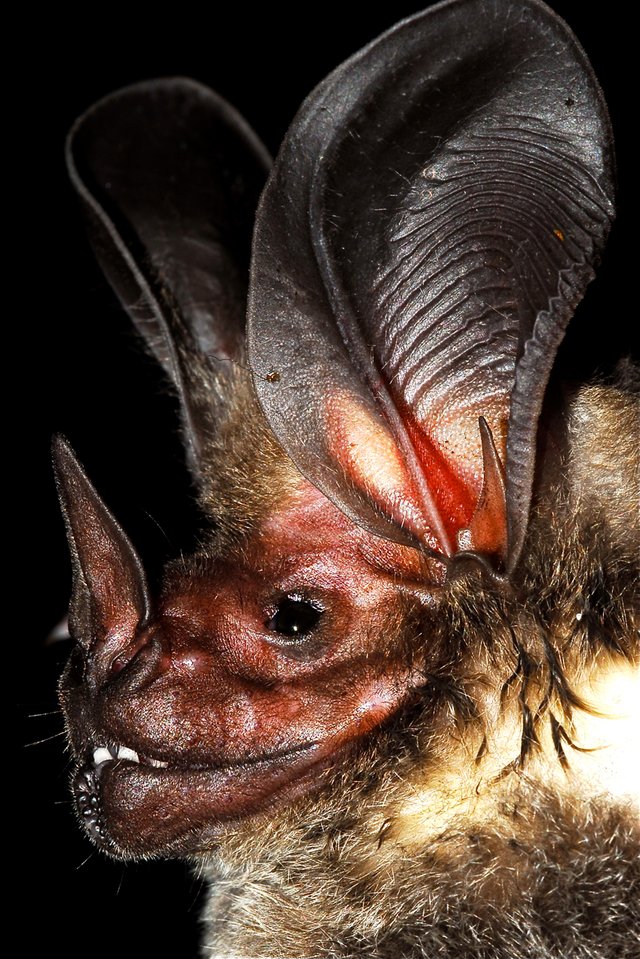Bats have been shown to be able to learn from other species of bats, and thus provide the first clue that species can teach other species things in the wild
When compared to other mammals of their own size, bats are really smart animals. Some of the species form huge colonies and exhibit extraordinary social behavior, such as apparent altruism where some bats will share food with other bats who are hungry. They are also able to grow to be over 40 years old, extremely old compared to what you might expect.

A fringe-lipped bat, one of the species used on the study. Image by Karin Schneeberger, posted with the Creative Commons Attribution 3.0 Unported license.
Scientists have been testing the intelligence of bats for a while, and even figured out how to make the bats teach each other to complete small “puzzles” in order to get food. This is really amazing by itself, but a research group from Smithsonian Tropical Research Institute (STRI) in Panama wanted to take it another step further and test if they could get bats from one species to teach bats from another species how to solve these puzzles, and it turns out that this was not as difficult as they even imagined.
The study design
The first experiment began when the research team tested if fringed-lipped bats (Trachops cirrhosis) would be able to learn from other bats from the same species. Do test this, the research team taught them to recognize a computer-generated tone that would be linked to a food reward.
The tone was not resembling anything, but in the wild these bats will hunt frogs when they hear their callings, so they are adapted to use audio cues as a signal for beginning a hunt and getting food.
What they found out was that the bats would eventually learn to associate the signal with food, but if they added new bats to a group that had already learned it, this new group would pick up on the association a lot faster.
Social learning is not uncommon at all, but it’s not really that often that we get to see it in lab conditions like it. Anyway, once the scientists were sure that the fringed-lipped bats would actually teach each other to respond to the correct signal, it was time to step it up.
This time they also introduced round-eared bats (Lophostoma silvicolum) into the experiment cage. As you can see from their scientific name, these two bats do not belong to the same genus, but they are ecologically much like each other, and exhibit a lot of the same behaviors such as hunting on audio cues.

A round-eared bat (Lophostoma silvicolum). Image by Desmodus, posted with the Creative Commons Attribution-Share Alike 3.0 Unported license.
These bats learn just as fast from the other species
The results from the experiment is pretty cool, and it turns out that the round-eared bats were able to pick up the signal just as quickly from the fringed-lipped bats as compared to the control group where they taught it to the same species. Apparently they are capable of learning from each other just as fine as they learn from their own species, which is really cool!
While there are some examples of one species teaching another species things, these examples are often seem between primates (mostly humans and captive apes) and domesticated animals such as dogs, cats or other pets. This is the first good example we see of two wild species being able to teach each other things, and this could also potentially happen in the wild.
It's important to keep in mind that this all happened inside a laboratory, but the animals were still considered to be wild, since they were not domesticated.
Why learning from other species is a great advantage to have in the wild
It makes perfect sense that some species are able to learn stuff from other species in the wild, because environmental learning is a much faster and better response to some environmental changes compared to just having an evolutionary response that could potentially take many generations before it takes full effect.
So when you are able to learn things from other species, such as how to predate on a certain species, this will give the learner an instantly benefit, and increasing its fitness without having much of a downside.
This research shows us that different animal species might actually cooperate to solve the issues faced when struck by environmental change, but to what extent this is happening in the wild is yet to be determined. It's still a very nice "proof of concept", and it would be really cool if scientists actually started to looking for this type of interspecific learning in different animal populations in the wild. Who knows which animals end up being shown to learn from others?
About @valth
Hey, I'm @valth - the author of this post. I love to write about nature, biology, animals, nature conservation, ecology and other related branches of science, and I occasionally write about my life, about Steem or about random stuff as well. I'm trying my best to write at least one post every day, so make sure to give me a follow if you enjoy my content and want to see more of it.
Join the @valth community!
I love nothing more than to engage with my readers, so please join the @valth community in the comment section. You will definitely find more information about the topic, personal experiences, questions, and even opposing views down there, so don't miss out on learning more.
I always reward users who post good comments, so please take the opportunity to share your views and get a small upvote in exchange for it.
Hi @Valth
By just looking at the photos in your post I can see why me and others dont like bats :) They are scary as h....
But as mammals they are quit unique as lousy, both in smartness and in social skills
That's interesting info..
Bats are considered intelligent species, it'll be great to see if others could learn so quickly
Thank you for your excellent post. I love reading about how smart other animals are. I get a bit sick of human supremacy (especially when we see to be the most unable species to learn from others - well we put ourselves so much higher than the humble bat. Great pictures.
That is quite a research.. Social learning in animals.. Wow
Yeah, it's pretty cool!
Now thats something new to learn that bats can learn from other species. Outstanding informative post. Scientists arw inventing new things and producing new things species and cloning but this adaptive learning is something attention catching. Looking forward to more posts from you. Really enjoyed your content.
I just fan of your article. you write it very well. we are inspired about scince & nature when we are read your article. just love it @valth. you are the only one. keep it up. best wishes for you. waiting for your next one. thanks
That's really interesting, it feels like so many animals are proven to be more intelligent than we thought so every day. Bats really needs attention. As far as I know compared to other species they are on a faster road to extinction. Nobody really cares about these 'ugly', yet fascinating creatures which make 1/4 of mammal species.
Really nice..not only individuals but animal species also learn from each other
Yep, it's very cool! :)
Everyone.Do you know which plant is smarter than the bats? It is Marcgravia evenia. It is endemic of the República de Cuba , it developed during the evolution the ability to invite bats using a single sheet. This sheet acts as a satellite, and its shape tells bats that there is a pleasant surprise there.And bats fertilized the plant. Marcgravia evenia
This plant has gone over the game.She moved to a higher level. If God asked me, Marko which plant would you be, I would say Marcgravia. @valth this post is great . Greetings from Serbia.
bats are so different species, looking so scary. Very interesting information of bats, they are hunt frogs...